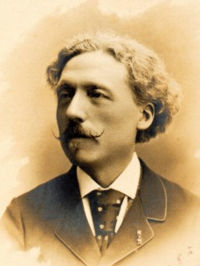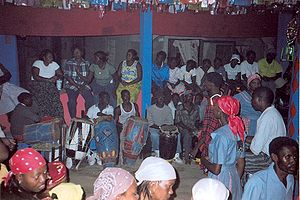
Ludovic Lamothe
Encyclopedia
Ludovic Lamothe was a Haiti
an composer and virtuoso
pianist. He is considered one of Haiti's most important classical composers.
, he was born into a distinguished literary family, and both his parents were pianists. His grandfather, Joseph Lamothe, was also a noted instrumentalist. Lamothe had his first lessons from his mother and studied the piano and clarinet at the Institution Saint Louis de Gonzague in his native Port-au-Prince where he exhibited exceptional technical and compositional abilities from a young age. In 1910, German merchants in Haiti recognised his talents and funded a scholarship for him to go and continue his studies in Paris
, France
. There he would study under Louis Diemer
at the Paris Conservatory.
 Lamothe returned to Haiti in 1911, remaining there for the rest of his life; he taught and gave private recitals on the piano in his home. He gained a reputation for reciting the works of Frédéric Chopin
Lamothe returned to Haiti in 1911, remaining there for the rest of his life; he taught and gave private recitals on the piano in his home. He gained a reputation for reciting the works of Frédéric Chopin
, his favourite composer, and he became known as the "Black Chopin",particularly amongst music scholars and middle-upper class men in Haiti. On one instance Lamothe was invited to perform an event at the Rex Theatre named “Un Chopin Noir” (A Black Chopin) to commemorate the anniversary of the death of Frederic Chopin. Lamothe recited, among others, Chopin's Polonaise in A Flat.
, from the most formal, elite-oriented forms to the méringue of the low orders. He was not only influenced by traditional European classical music, but he was influenced by local traditions including Haitian Vodou ceremonial music and carnivals and Haitian peasant culture and influences which reflected a shared African heritage. One scholar has described Lamothe's repertoire as "predominantly classical in form, but creole in inspiration. Another musical scholar, Claude Carré of the online magazine Boutoures has described Lamothe as "representing the nationalist movement in Haitian classical music" and being "an emblematic figure, a piano virtuoso and a performer of Chopin, who left us a number of important compositions for piano."
 His fusion of styles and class influences in his music were regarded by scholars as reducing the polarisation in classes in Haiti in the early to mid-twentieth-century Haiti and giving them a unique shared identity through a musical spectrum. One of his notable works is entitled, La Dangereuse, a slow tempo piece with gentle, restrained dynamics, was warmly received by the Haitian aristocracy.
His fusion of styles and class influences in his music were regarded by scholars as reducing the polarisation in classes in Haiti in the early to mid-twentieth-century Haiti and giving them a unique shared identity through a musical spectrum. One of his notable works is entitled, La Dangereuse, a slow tempo piece with gentle, restrained dynamics, was warmly received by the Haitian aristocracy.
In 1934, Lamothe won a Port-au-Prince city council competition for his "Carnival méringue", which he entitled Nibo. Well received by all walks of society in Haiti, Nibo became known as a Liberation Anthem. a piece to mark the withdrawal of American forces from Haiti in August of that year.
and Paris
, so he was not generating enough income to sustain a living. On 9 February 1944, he was forced to sell up his home that he had lived in much of his life, but his continued musical status amongst the elite in Haiti meant that enough money was raised to aid him in buying a new home.
Lamothe later went on to become Chief of Music of the Republic of Haiti. He died in Port-au-Prince in 1953.
Although little of his music was published even in his native Haiti during his life, after his death his family collected his manuscripts and had them printed privately. A collection of his pieces was published in Port-au-Prince in 1955, entitled simply, Musique de Ludovic Lamothe.
In 2001, a CD recording of Lamothe was published on the IFA Music Records label, released in 2001 featuring some of his pieces, the Ballade in A Minor, Danza No. 1 (La Habanera), Evocation, and Danse Espagnole No. 4 , performed by Latino-Caribbean pianist, Charles P. Phillips.
In 2006, a book entitled Vodou Nation: Haitian Art Music and Cultural Nationalism by the Chicago Studies in Ethnomusicology cited numerous examples of Lamothe's compositions to illustrate his cultural contribution to Vodou music. They cited in particular, La Dangereuse, Nibo, Sous la Tonnelle, Loco and Sobo.
Haiti
Haiti , officially the Republic of Haiti , is a Caribbean country. It occupies the western, smaller portion of the island of Hispaniola, in the Greater Antillean archipelago, which it shares with the Dominican Republic. Ayiti was the indigenous Taíno or Amerindian name for the island...
an composer and virtuoso
Virtuoso
A virtuoso is an individual who possesses outstanding technical ability in the fine arts, at singing or playing a musical instrument. The plural form is either virtuosi or the Anglicisation, virtuosos, and the feminine form sometimes used is virtuosa...
pianist. He is considered one of Haiti's most important classical composers.
Early life
A native of Port-au-PrincePort-au-Prince
Port-au-Prince is the capital and largest city of the Caribbean nation of Haiti. The city's population was 704,776 as of the 2003 census, and was officially estimated to have reached 897,859 in 2009....
, he was born into a distinguished literary family, and both his parents were pianists. His grandfather, Joseph Lamothe, was also a noted instrumentalist. Lamothe had his first lessons from his mother and studied the piano and clarinet at the Institution Saint Louis de Gonzague in his native Port-au-Prince where he exhibited exceptional technical and compositional abilities from a young age. In 1910, German merchants in Haiti recognised his talents and funded a scholarship for him to go and continue his studies in Paris
Paris
Paris is the capital and largest city in France, situated on the river Seine, in northern France, at the heart of the Île-de-France region...
, France
France
The French Republic , The French Republic , The French Republic , (commonly known as France , is a unitary semi-presidential republic in Western Europe with several overseas territories and islands located on other continents and in the Indian, Pacific, and Atlantic oceans. Metropolitan France...
. There he would study under Louis Diemer
Louis Diémer
Louis-Joseph Diémer was a French pianist and composer.- Life :Diémer studied at the Paris Conservatoire, winning premiers prix in piano, harmony and accompaniment, counterpoint and fugue, and solfège, and a second prix in organ...
at the Paris Conservatory.

Frédéric Chopin
Frédéric François Chopin was a Polish composer and virtuoso pianist. He is considered one of the great masters of Romantic music and has been called "the poet of the piano"....
, his favourite composer, and he became known as the "Black Chopin",particularly amongst music scholars and middle-upper class men in Haiti. On one instance Lamothe was invited to perform an event at the Rex Theatre named “Un Chopin Noir” (A Black Chopin) to commemorate the anniversary of the death of Frederic Chopin. Lamothe recited, among others, Chopin's Polonaise in A Flat.
Compositions
As a composer, Lamothe wrote expressionly for his own instrument, and became known especially for his songs and short piano pieces. Lamothe's repertoire included a range of méringueMéringue
Méringue, also spelled "mereng" in Creole, is a music genre native to Haiti . It is musically and historically connected to Dominican Merengue. It is a guitar-based style , and is generally sung in Haitian Creole.-History:The history of méringue is similar to that of much Caribbean popular music...
, from the most formal, elite-oriented forms to the méringue of the low orders. He was not only influenced by traditional European classical music, but he was influenced by local traditions including Haitian Vodou ceremonial music and carnivals and Haitian peasant culture and influences which reflected a shared African heritage. One scholar has described Lamothe's repertoire as "predominantly classical in form, but creole in inspiration. Another musical scholar, Claude Carré of the online magazine Boutoures has described Lamothe as "representing the nationalist movement in Haitian classical music" and being "an emblematic figure, a piano virtuoso and a performer of Chopin, who left us a number of important compositions for piano."

In 1934, Lamothe won a Port-au-Prince city council competition for his "Carnival méringue", which he entitled Nibo. Well received by all walks of society in Haiti, Nibo became known as a Liberation Anthem. a piece to mark the withdrawal of American forces from Haiti in August of that year.
Later life and post-recognition
Later in life, Lamothe encountered some serious financial problems, largely due to the fact he had not published many works internationally, only two, and even those were limited to BerlinBerlin
Berlin is the capital city of Germany and is one of the 16 states of Germany. With a population of 3.45 million people, Berlin is Germany's largest city. It is the second most populous city proper and the seventh most populous urban area in the European Union...
and Paris
Paris
Paris is the capital and largest city in France, situated on the river Seine, in northern France, at the heart of the Île-de-France region...
, so he was not generating enough income to sustain a living. On 9 February 1944, he was forced to sell up his home that he had lived in much of his life, but his continued musical status amongst the elite in Haiti meant that enough money was raised to aid him in buying a new home.
Lamothe later went on to become Chief of Music of the Republic of Haiti. He died in Port-au-Prince in 1953.
Although little of his music was published even in his native Haiti during his life, after his death his family collected his manuscripts and had them printed privately. A collection of his pieces was published in Port-au-Prince in 1955, entitled simply, Musique de Ludovic Lamothe.
In 2001, a CD recording of Lamothe was published on the IFA Music Records label, released in 2001 featuring some of his pieces, the Ballade in A Minor, Danza No. 1 (La Habanera), Evocation, and Danse Espagnole No. 4 , performed by Latino-Caribbean pianist, Charles P. Phillips.
In 2006, a book entitled Vodou Nation: Haitian Art Music and Cultural Nationalism by the Chicago Studies in Ethnomusicology cited numerous examples of Lamothe's compositions to illustrate his cultural contribution to Vodou music. They cited in particular, La Dangereuse, Nibo, Sous la Tonnelle, Loco and Sobo.

